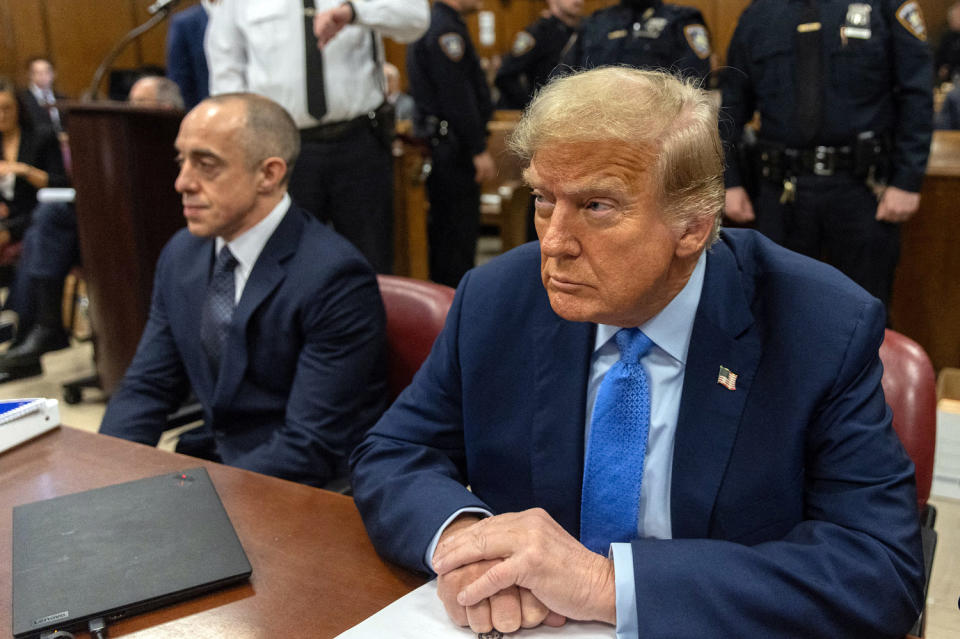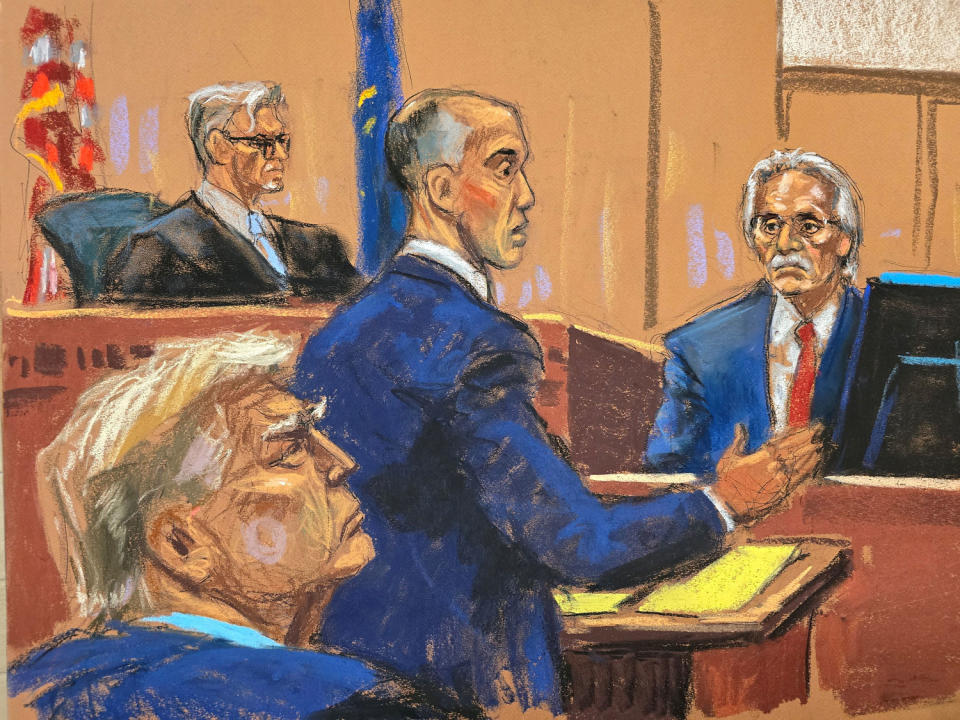Longtime Trump assistant and bank executive each take the stand in hush money trial
- Oops!Something went wrong.Please try again later.
- Oops!Something went wrong.Please try again later.
- Oops!Something went wrong.Please try again later.
The prosecution moved on to its second witness in its case against Donald Trump after former National Enquirer publisher David Pecker finished his testimony, which included attempts by defense attorneys to muddy his remarks about a joint scheme to benefit Trump’s 2016 campaign.
Pecker's dramatic testimony was followed by two other witnesses, including Rhona Graff, Trump’s longtime assistant and gatekeeper, who said she was testifying pursuant to a subpoena.
Graff said she worked for the Trump Organization for 34 years and was responsible for maintaining Trump's list of contacts and his calendar. People on the contacts list — which prosecutors have a copy of — included former Playboy model Karen McDougal and adult film star Stormy Daniels, Graff acknowledged. Both women have alleged that they had sexual relations with Trump in 2006 and received money to keep quiet about their claims during his 2016 presidential campaign. Trump has denied their claims.

The listing for McDougal included multiple phone numbers and addresses. The contact information for Daniels just said "Stormy" and included a cellphone number, Graff confirmed after their listings were shown in court.
Asked by prosecutor Susan Hoffinger if she'd ever seen Daniels in a reception area at Trump Tower, Graff said she had a "vague recollection" of that. Asked if she knew that Daniels was an adult film actress, Graff said, "Yes, I did."
Prosecutors used Graff's testimony to authenticate Trump's contact list and calendar, while Trump's lawyers used it show another side of their client. Graff testified her job was "exciting" and "stimulating." Asked if Trump was a good boss, Graff said, "I think he was fair." Asked if she felt Trump respected her, Graff said, “I don’t think I would have been there 34 years if he didn’t.”
Trump attorney Susan Necheles asked Graff if the reason Daniels had been at Trump Tower was to discuss appearing on Trump's show "Celebrity Apprentice."
"That was the office chatter, yes," Graff responded.
Trump's lawyers took a tougher tone with Pecker, who began his testimony Monday as the prosecution's first witness.
Pecker had told jurors that Trump and his then-lawyer Michael Cohen had asked him in a 2015 meeting to be their "eyes and ears" when it came to salacious stories that could undermine Trump's candidacy, and also asked him to print negative stories about Trump's opponents.
Pecker testified Thursday that Trump thanked him for his help in suppressing two scandalous stories in a 2017 meeting at Trump Tower, when Trump was president-elect. On Friday, Trump attorney Emil Bove asked Pecker about an FBI interview he sat for in 2018, where the agents said he told them "Trump did not express any gratitude" for his help.
"So the FBI notes here — what somebody is writing down — could be wrong," Pecker said, adding, "I know what the truth is," and it's that Trump thanked him for his assistance.
“So your testimony is inconsistent with what is written in that report?” Bove pressed. “Yes,” Pecker replied.
Follow-up questions from prosecutor Joshua Steinglass showed Pecker had told the FBI about the exchange with Trump in a separate interview about a week later. "Was it the truth then?" he asked, and "is it the truth now?" Pecker answered "yes" to both questions.
Trump has pleaded not guilty to 34 counts of falsifying business records.
Bove also got Pecker to acknowledge the National Enquirer had already been running negative articles about Hillary Clinton, who became the 2016 Democratic nominee for president. Running negative stories about Clinton and her husband, former President Bill Clinton, was "no issue for you, correct?" Bove asked. Pecker said it was not.

Bove noted that negative articles about Trump's Republican rivals in the race at the time, Sen. Marco Rubio of Florida and Dr. Ben Carson, contained information that was recycled from other news outlets, and asked if that “was cost-efficient and made business sense.” “Yes,” Pecker replied.
Pecker was also questioned about the Enquirer's files and records on Trump, which he had said Trump wanted to purchase and Cohen had asked to go through.
“You’re not suggesting that there’s some trove of sensitive information about President Trump at the Enquirer,” Bove said.
Pecker replied, "There's nothing in those boxes."
"They are worthless?" Bove asked.
"Yes," Pecker responded.
When cross-examination of Pecker began Thursday, Bove immediately set out to poke holes in his credibility, getting him to acknowledge times he had mixed up dates and that the passage of time could affect his memory.
“There are some gaps, correct? Because it was a long time ago?” Bove asked.
“Yes,” Pecker replied.
Bove also got Pecker, 72, to acknowledge that it wasn't unusual for the paper to buy stories from sources that it wouldn't print. Pecker said about half the stories it bought didn't wind up getting printed, although some about celebrities were used as leverage to get other stories from them. He said the tabloid had used hundreds of thousands of nondisclosure agreements with sources over the years.
Steinglass asked on redirect examination Friday afternoon how many of those NDAs they'd coordinated with a presidential candidate in order to help their campaign. "It's the only one," Pecker replied.
He added it was also the only one where he'd negotiated with a "presidential candidate's fixer" — Cohen — on the terms of those NDAs.
Pecker testified this week that he was involved in efforts to kill three stories that could have been damaging to Trump's 2016 campaign. The first involved a doorman who claimed Trump fathered an illegitimate child. The paper paid the doorman $30,000 for his silence, even though, Pecker told the court, the claim was later determined to be “absolutely 1,000% untrue.”
The second story involved McDougal's claim that she had a monthslong affair with Trump that began in 2006. Pecker said he believed her account, in part because, he said, Trump had told him that she was "a nice girl." Pecker wound up paying her $150,000 for the rights to her story, money he said he initially wanted Trump to pay back before he decided it could cause him legal problems if Trump did so.
Pecker said he was less involved in the third story, which involved Daniels, who claims she had a sexual encounter with Trump in 2006. Pecker said he refused to pay her for her story but encouraged Cohen to do so.
Pecker told the court that one of his employees, Enquirer editor-in-chief Dylan Howard, helped negotiate the terms of their eventual $130,000 deal. Trump later repaid Cohen in payments that were listed as legal expenses, which prosecutors say was a sham.
The final witness Friday was Gary Farro, a bank executive who helped Cohen set up the bank account for the shell company he used to pay Daniels. Prosecutors are using his testimony to authenticate documents related to the transaction. His testimony will continue when the trial resumes Tuesday morning.
This article was originally published on NBCNews.com

